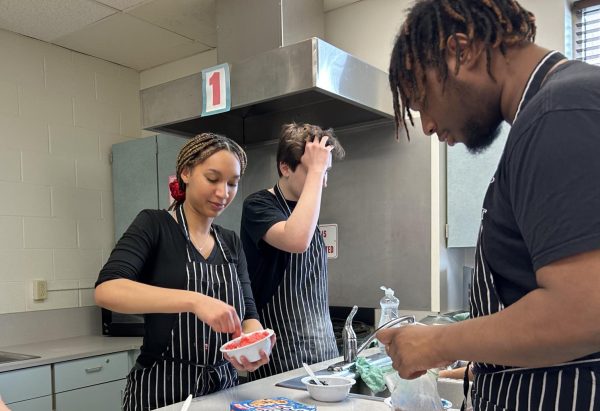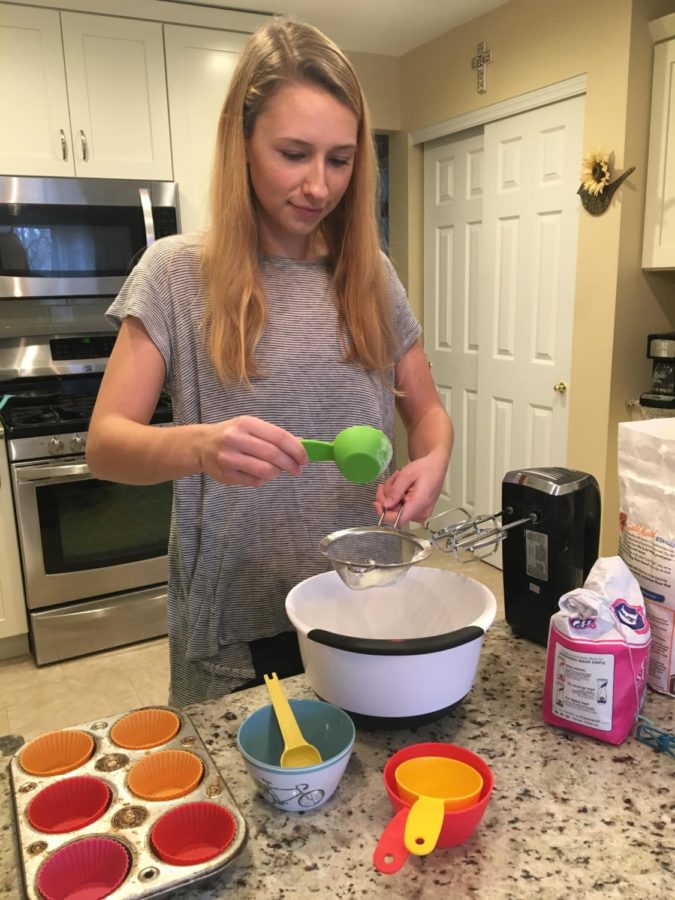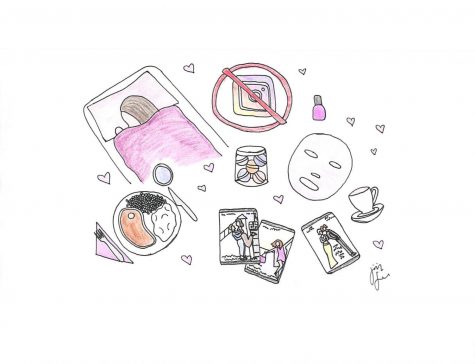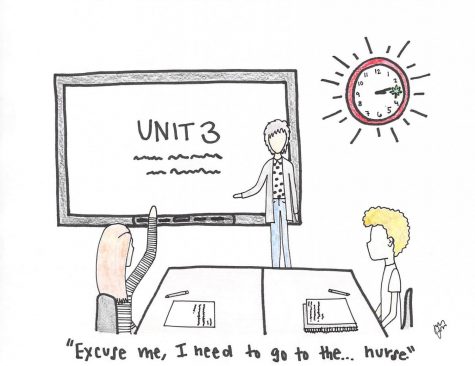Bakers Deal with the Bittersweet Side of Procrastination
Media by Kathy Curran
Katie Curran, junior, sifts flour in order to prepare her ingredients. Curran began procrastibaking freshman year in order to deal with the stress of school.
Coming home after a long day of tests, quizzes and homework, many students feel the pressure and stress often associated with school.
While some students may choose to calm down through watching their favorite Netflix shows, others, including Katie Curran, junior, bake as a way to deal with stress.
Although baking helps to deal with current stress, it can lead to more stress in the future. By putting off work to engage in baking unnecessary desserts, students are taking part in the trend of procrastibaking.
“Procrastibaking is a stress reliever, but also the illusion of productivity,” Curran said. “I do a lot of things to procrastinate, and baking and cleaning are two of my favorite things because you feel like you accomplished something. Like with baking, you get these wonderful muffins as a result.”
Curran finds that procrastibaking really became a part of her routine freshman year.
“I’d come home a lot, be super stressed and feel the need to bake,” Curran said. “I made so many pumpkin muffins that year, and I was just always baking.”
Although Curran still enjoys baking, she has been more efficient with schoolwork, and has found the motivation this year to beat procrastination.
“I don’t procrastibake as much this year,” Curran said. “I don’t think I have as much homework this year, and if I do, I’ve gotten much better at actually sitting down and doing the work.”
While making desserts for a French project, Sarena Yeung, junior, first began to develop her passion for baking.
“I think baking is therapeutic in that it’s very methodical and very precise so it’s not a lot of thinking most of the time,” Yeung said. “It also takes time so I don’t have to do my homework.”
Yeung said among all of the treats she has created, she enjoys baking macarons for both her friends and family the most. She said creme brulee is a close second, as it is her mother’s favorite treat and a simple recipe to follow.
“I want to make my friends happy or see them smile the next day because everyone’s stressed,” Yeung said.
Although Yeung enjoys making other people happy with her desserts, she said procrastibaking sometimes leads to more stress afterwards by using up time to complete homework or study for tests.
Yeung said, until recently, she didn’t realize procrastibaking was such a common habit because many high school students opt for other methods of procrastination such as watching Netflix rather than baking.
“I got really stressed out one day, and decided to make cookies,” Yeung said. “I didn’t want to eat them, so I ended up bringing them to school. It kind of became a force of habit and now, sometimes people will ask me to bring in treats.”
Brittany Sharitz, language arts teacher, said she definitely understands the appeal of procrastibaking.
“It’s that feeling of having a lot going on in life, and knowing the comfort that taking a moment to bake something for yourself and others can provide,” Sharitz said. “It allows you to refocus and accomplish what you need.”
Sharitz said she doesn’t procrastibake often, but knows activities like baking can help relieve the stress and tension that everyday life can bring for people.
“I’ve had students in the past get that stress relieving factor from baking,” Sharitz said. “It’s also just really important to have hobbies that allow you to take your attention off school and work. For some students, procrastibaking definitely helps to give them a break in the chaos of life.”
Despite the fact that baking to put off work can be seen as unproductive, Sharitz said procrastibaking is just another form of productivity.
“You’re still creating something,” Sharitz said. “And you could still be thinking of an essay you have to write, or an errand you have to do. Having a task that keeps your hands busy and gives your mind time to process things in a different way can really help you to refocus in a healthy way. And if procrastibaking is the way some people do that, it’s not all that bad of an idea.”
Piers Steel, author and professor at the University of Calgary, worked with others to identify 30 scientifically tested and supported techniques to combat procrastination.
“The easiest one makes the most sense,” Steel said. “We all know we have motivation before naturally occurring deadlines. So, we reverse-engineered those natural deadlines so we could create artificial ones as effective.”
One of Steel’s favorites techniques to beat procrastination is by changing the environment one works in to make temptations harder to get to such as eliminating technology devices from the surrounding area.
Steel said procrastination negatively affects the overall well-being of students because it is putting off work despite expecting to be worse off in the future.
“Your own expectations are usually borne out and you would feel better if you started earlier,” Steel said.
Your donation will support the student journalists of Marquette High School. Your contribution will allow us to purchase equipment and cover our annual website hosting costs. You may become a PATRON by making a donation at one of these levels: White/$30, Green/$50, Blue/$100. Patron names will be published in the print newsmagazine, on the website and once per quarter on our social media accounts.

Kailin Zhang, senior, is the Online Editor for the Messenger, and has been part of the Messenger since 2017. Kailin is also involved with the National...

Mansi Mamidi, senior, is the Copy Editor for the Messenger. She is president of Mock Trial and is also a part of Youth and Government and SASA. She learns...












